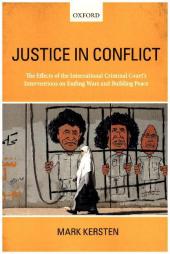 Neuerscheinungen 2016Stand: 2020-02-01 |
Schnellsuche
ISBN/Stichwort/Autor
|
Herderstraße 10
10625 Berlin
Tel.: 030 315 714 16
Fax 030 315 714 14
info@buchspektrum.de |

Mark Kersten
Justice in Conflict
The Effects of the International Criminal Court´s Interventions on Ending Wars and Building Peace
2016. 272 S. 234 mm
Verlag/Jahr: OXFORD UNIVERSITY PRESS; OUP OXFORD 2016
ISBN: 0-19-877715-9 (0198777159)
Neue ISBN: 978-0-19-877715-1 (9780198777151)
Preis und Lieferzeit: Bitte klicken
It has been said that we no longer consider whether to pursue justice, but how and when. Justice no longer follows in the wake of peace; it is pursued while violent political conflicts are on-going. This book explores the relationship between peace and justice through an analysis of the interventions of the ICC into on-going and active conflicts.
What happens when the international community simultaneously pursues peace and justice in response to ongoing conflicts? What are the effects of interventions by the International Criminal Court (ICC) on the wars in which the institution intervenes? Is holding perpetrators of mass atrocities accountable a help or hindrance to conflict resolution? This book offers an in-depth examination of the effects of interventions by the ICC on peace, justice and conflict
processes. The ´peace versus justice´ debate, wherein it is argued that the ICC has either positive or negative effects on ´peace´, has spawned in response to the Court´s propensity to intervene in conflicts as they still rage. This book is a response to, and a critical engagement with, this debate.
Building on theoretical and analytical insights from the fields of conflict and peace studies, conflict resolution, and negotiation theory, the book develops a novel analytical framework to study the Court´s effects on peace, justice, and conflict processes. This framework is applied to two cases: Libya and northern Uganda. Drawing on extensive fieldwork, the core of the book examines the empirical effects of the ICC on each case. The book also examines why the ICC has the effects that it does,
delineating the relationship between the interests of states that refer situations to the Court and the ICC´s institutional interests, arguing that the negotiation of these interests determines which side of a conflict the ICC targets and thus its effects on peace, justice, and conflict processes.
While the effects of the ICC´s interventions are ultimately and inevitably mixed, the book makes a unique contribution to the empirical record on ICC interventions and presents a novel and sophisticated means of studying, analyzing, and understanding the effects of the Court´s interventions in Libya, northern Uganda - and beyond.
Kersten provides a compelling and perceptive examination of one of international criminal justices most difficult conundrums... It is remarkable, I think, that after having produced one of the most sophisticated recent studies on the debate, Kersten arrives at the following conclusion: there may never be a consensus regarding the effects of the ICC on peace, justice and conflict processes. Christof Royer (University of St Andrews), International Affairs Book Reviews
Mark Kersten is a researcher, teacher and consultant currently based at the Munk School of Global Affairs, University of Toronto, Canada. Mark holds a PhD in International Relations from the London School of Economics (2014). In 2011, Mark founded the blog Justice in Conflict , which regularly publishes articles on the challenges of pursuing accountability and justice in the context of ongoing violent political conflicts. Mark´s research features regularly in
publications such as Foreign Policy, The Washington Post, and the Globe and Mail. He has taught courses on genocide studies, the politics of international law, diplomacy, and conflict and peace studies at the London School of Economics and SOAS. In addition, Mark is the Director of Research at the Wayamo
Foundation.


